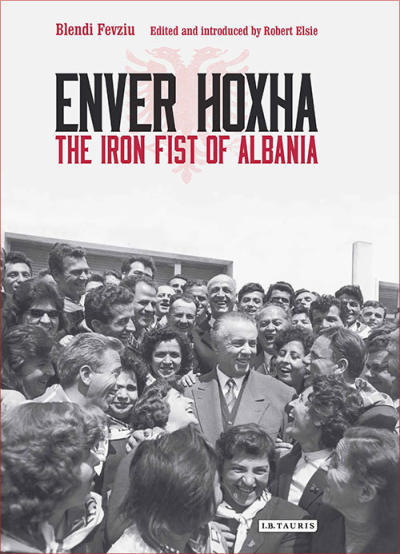
Blendi Fevziu
Enver Hoxha: the Iron Fist of Albania
Edited and introduced by Robert Elsie
Translated by Majlinda Nishku
ISBN 978-1-178453-485-1 I.B. Tauris, London 2016 xii + 300 pp.Foreword
Stalinism, that particularly sombre phase of Eastern European communism, came to an end in most of Eastern Europe with the death of Josef Stalin in 1953 or at least with the Khrushchev reforms that began in the Soviet Union in 1956. However, in one country - Albania - Stalinism survived unscathed until 1990. The regime that the Albanian dictator Enver Hoxha (pronounced hodja) led from the time of the communist takeover in November 1944 until his death in April 1985, and that continued unabated under his successor Ramiz Alia until 1990, was severe indeed. Such was the reign of terror that no audible voice of opposition or dissent ever arose in the little Balkan state, a European country that was as isolated from the rest of the planet as North Korea is today. When the Albanian communist system finally imploded and multi-party democracy was introduced in 1990-1991, it left behind a weary population, frightened and confused after decades of purges and political terror. It also left behind a land with a sub-Saharan economy, a country where extreme poverty was the norm. It has been over two decades since the communist regime in Albania came to an end. The people of Albania, who woke up to find themselves at the bottom of the barrel in European terms, have been struggling since that time to keep pace with the new world around them. In their struggle, they have not had much time to look back dispassionately and reflect on the man who dominated their lives for almost half a century. Yet the spectre of Enver Hoxha looms heavy over the land and most observers would agree that the Albanians are still coping in one way or another with the after-effects of his regime. Few Albanians today will have a good word to say about the man who was once their God, but what do they actually know about him? Some still have recollections of the public image, created by official propaganda at the time, of their supreme leader as a benevolent "father Enver" and imagine that, in his isolation in the Bllok with no one daring to contradict him, he may perhaps not have known how dire the situation at the grass roots really was. Others curse him as the devil incarnate who was directly responsible for all of the regime's failings, yet they, too, have no precise idea of the role he played in the calamities that beset the nation during communism. Who was Enver Hoxha? Or are people still too frightened to ask? It is curious amidst all the speculation associated with his name that in the twenty years since the fall of the dictatorship, not one serious book has been published about Enver Hoxha. Until now. In the early years of the new millennium, Tirana journalist and television personality Blendi Fevziu began broadcasting a series of television programmes on the communist dictatorship and on the life of Enver Hoxha, based on previously unpublished archival material and unseen film footage - revelations that shocked the nation. He also conducted exclusive interviews with leading personalities of the communist period who had known Enver Hoxha personally and who were now willing to talk. Investigative journalism at its best. The material compiled by Fevziu for television has now been transformed into the first biography of Enver Hoxha since the fall of the communist regime. The original, Albanian- language version of this book appeared on the market in October 2011 when it was presented with great success at the annual book fair in Tirana. It is safe to say that no book in the history of Albanian publishing has had such success. Everyone suddenly wanted to know who Enver Hoxha really was. Within the space of a few weeks, the biography went through five or six editions and the publishers could barely keep up with demand. Such was public reaction, that the book was even burned at public protests in four or five Albanian cities. These protest meetings were organised by the few aging supporters of the old regime or, more often than not, by confused nationalist circles in Kosovo and Albania who regarded an attack on Enver Hoxha as an attack on the Albanian nation. This book, based on archival sources and on interviews with people who knew the dictator, traces the life of a man who ruled a European nation with an iron fist for forty years, and whose cruelty cannot be justified by a lack of knowledge or by any legitimate requirements of the state. After the success of the Albanian-language edition, it is now a pleasure to present the biography of Enver Hoxha to the international public. To assist the general reader, a brief chronology of Hoxha’s life, a glossary of the principal figures mentioned in the book, a list of abbreviations, and a bibliography have been appended to the English edition. Whether copies of this volume will be burned in public, too, remains to be seen. Robert Elsie Berlin, November 2015



| Robert Elsie | AL Art | AL History | AL Language | AL Literature | AL Photography | Contact |
